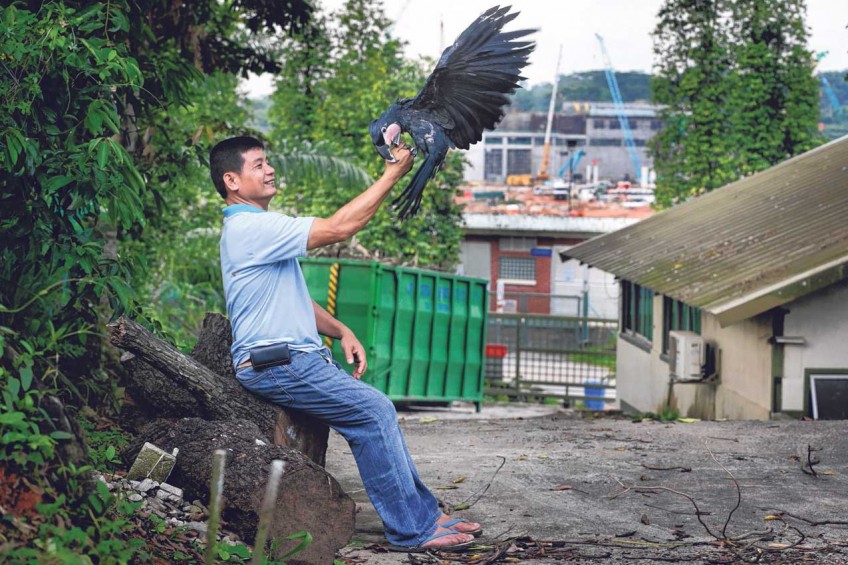Mandai Birds Sanctuary gets lifeline

A quiet lane off Mandai Road stirs with activity at the crack of dawn every day as Mr Rosendo Jacildo, 45, and his co-workers get breakfast ready for about 3,000 mouths.
They dice fruits and vegetables or boil beans in a makeshift kitchen for over an hour before making their rounds to feed each feathered resident of the Mandai Birds Sanctuary.
"I've taken care of the birds since they were babies. When they mature and they're healthy, I feel joy," said Mr Jacildo.
The sanctuary curator, who is from the Philippine island of Luzon, has been living and working on the sprawling 2ha compound in Lorong Lada Hitam since 1996, two years after the facility opened.
Since then, it has grown to house more than 3,000 birds across 125 species, including some rare cockatoos, macaws and lories.
But last November, it was given a final notice to vacate the state land by May 31 this year.
Mr Jacildo, like the birds, had been waiting for a new home since then.
In February, the sanctuary's founders were approached by a landscaping nursery, which offered them an available 1ha site at its Sungei Tengah premises.
But not optimistic that they would be able to relocate in time, they made several appeals to the Singapore Land Authority (SLA) to extend its tenancy.
After grappling with an uncertain fate for half a year, the sanctuary finally received a lifeline yesterday.
Co-founder Daniel Teo, 73, was told that the lease would be extended till February next year. The SLA confirmed this. Relieved, Mr Teo said that the extra time will allow them to plan how to turn at least five of the seven greenhouses at the new site into aviaries.
"It means a lot to us. We can now have a good sleep tonight," echoed Mr Jacildo. "If the deadline is really the end of May, the birds will suffer because the new aviaries are not up yet. The birds may also be exposed to the threat of rodents."
The Agri-Food and Veterinary Authority said that it would need to license the sanctuary for animal health and welfare as well.
The situation remains bittersweet for Mr Jacildo, who would have to part with at least half of the collection of birds. The new, smaller premises can take in fewer of them. The sanctuary is selling the birds in bulk to breeders abroad.
Many of the adult birds were personally bred by Mr Jacildo in his first few years at the sanctuary. This includes the black palm cockatoo, one of his favourite species.
Known for its majestic appearance and gentle nature, it often takes about 15 years to mature.
"They're like my children. If I could, I wouldn't sell them at all. But the only choice now is to let them go," he said.
He is also worried that the birds may fall ill during the move. "It's easy for me to adapt. I'm used to a hard life. For the birds, it depends."
Mr Jacildo was a farmer in the Philippines before he got the job here. He picked up bird breeding by reading books.
At the sanctuary, he started with simple cleaning and feeding tasks, but now replies to client e-mails and arranges shipments after learning to use a computer eight years ago.
In the evenings, he enjoys making video calls to his three daughters - aged 10, 13 and 17 - in Luzon.
He takes them around the sanctuary via video to update them on a few of their favourite birds - Joyjoy, Sunshine and Rainbow - which they met during their last visit five years ago.
"My life has changed since I got onto the plane and left Philippines for the first time. I thought I would earn some money, then go back after five years to start my own business," said Mr Jacildo.
"But now, it has been 20 years. As long as my body can take it, I want to stay here with the birds."

This article was first published on May 19, 2016.
Get a copy of The Straits Times or go to straitstimes.com for more stories.